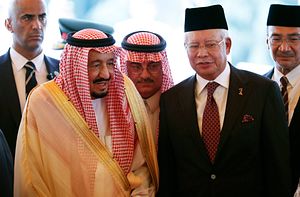On November 26, the defense ministers of a Saudi Arabia-led, pan-Islamic anti-terrorism coalition met in Riyadh for their first coalition meeting to both officially launch the coalition as well as discuss potential initiatives and partnerships. Malaysia was among those present in yet another illustration of the Southeast Asian state’s cultivation of closer ties with Riyadh as well as its broader counterterrorism efforts with external partners.
As I have noted before, in addition to being part of the U.S.-led Global Coalition to Counter the Islamic State, Malaysia is also a member of 41-member pan-Islamic anti-terrorism coalition first announced in Saudi Arabia in December 2015 that came to be called the Islamic Military Counter Terrorism Coalition (IMCTC). Malaysia, along with Brunei, are the two Muslim-majority Southeast Asian states that thus far have been official members (Indonesia, the other, is not an official member).
Malaysia’s involvement in the IMCTC has increased the scrutiny on some of its military activities and interactions in the Middle East, including the evacuation of Malaysians trapped in Yemen (See: “Why is Malaysia in Saudi-led War Games in the Middle East?”). This is the case even though defense officials have clarified that Malaysia’s official contributions to the IMCTC will likely be in other areas such as intelligence sharing
Bilateral cooperation between Malaysia and Saudi Arabia has also been boosted since, with an example being the new King Salman Center for International Peace (KSCIP) (See: “Where is the New Malaysia-Saudi Arabia Counterterrorism Center?”). KSCIP was originally designed as a center to counter narratives and ideologies and promote Islam as a religion of peace and moderation, following the establishment of other centers in Malaysia including the Regional Counterterrorism Digital Communication Center in the Southeast Asia Regional Center for Counterterrorism (SEARCCT) established with the United States and Malaysia’s own Counter Messaging Center (CMC) run by the Royal Malaysian Police (See: “US, Malaysia and the War Against the Islamic State”).
Since then, the IMCTC itself has also gradually begun to take shape. In March 2016, chiefs of staff from interested countries met in Riyadh and agreed that they would work together to confront the threat under the banner of the IMCTC. And in May 2017, a Arab-U.S. summit in Riyadh had unveiled that alliance member states would deploy 34,000 troops to support operations against terrorist groups in Iraq and Syria.
On Sunday, the defense ministers of the alliance met in the Saudi capital of Riyadh for the inaugural meeting of the IMCTC Ministers of Defense Council and for the formal launch of the IMCTC. The official objectives of the ministerial meeting, held under the theme of “Allies Against Terrorism,” were to consolidate participation and integration in the coalitions, to strengthen mechanisms for greater involvement by member countries as well as supporting nations, international organizations, and experts, and to propose initiatives to be considered for development and eventual implementation.
The background for the meeting received much more press coverage than the actual interactions. Headlines in particular focused on the fact that Qatar was not invited to the meeting – the latest sign of tensions following the severing of ties between Qatar and several Gulf states. The meeting also took place as a deadly attack occurred at an Egyptian mosque in the Sinai Peninsula last week, in which over 300 people were killed and many more injured.
In his opening address to the meeting, Saudi Crown Prince Mohamed bin Salman, who also holds the defense portfolio, highlighted that the IMCTC’s significance lay in the increased level of coordination of efforts among concerned states that had not existed before. The meeting also subsequently featured keynote speeches in the four domains of focus within the IMCTC: ideology; communications; counterterrorism financing; and military, which were delivered respectively by Mohammad bin Abdul Karim Al-Issa, Secretary General of the Muslim World League; Mohammad Al Momani, Jordanian Minister of State for Media Affairs and Communications; Ahmed Abdulkarim Al-Kholifey, the chairman and governor of the Saudi Arabia Monetary Agency; and Pakistan military chief Raheel Sharif.
Malaysian Defense Minister Hishammuddin Hussein was also present at the meeting as expected. Ahead of the meeting, Hishammuddin had said he would highlight the threat of terrorism in Southeast Asia, as manifested by the siege by Islamic State-backed militants in the southern Philippine city of Marawi (See: “ASEAN’s Post-Marawi Islamic State Challenge”).
As I have noted before, though the siege is officially over, the terrorism threat itself remains quite serious. This is true even if, from a longer-term comparative perspective, the official statistics by the IMCTC indicate that the Asia-Pacific ranks fourth regionally in terms of attacks and deaths that occurred from 2002 to 2016, with 5,831 (the first is the Middle East and North Africa, with 83,532; the second is South Asia, with 53,229; the third is sub-Saharan Africa, with 35,559).
Hishammuddin had also said he would mention ongoing Southeast Asian cooperation to address the threat to encourage the sharing of experiences and even potential support from other outside states. From Malaysia’s perspective, his has taken various forms, whether it be bilateral cooperation discussed with other Muslim-majority states like Indonesia and Brunei to trilateral maritime and aerial patrols conducted with Indonesia and the Philippines tied to the Sulu-Sulawesi Seas (See: “Confronting Threats in the Sulu-Sulawesi Seas: Opportunities and Challenges”).
In his intervention at the meeting, Hishammuddin emphasized the severity of the threat and underscored the need to forge unity in spite of any differences since it was the duty of leaders of Muslim nations to confront terrorists who had tarnished the face of Islam.
Though few specifics were unveiled about further steps that the IMCTC will take, the Acting Secretary General Lieutenant General Abdulelah AlSaleh did outline its general strategy, governance, activities, as well as future intended plans. The final declaration issued by member countries also emphasized their resolve to undertake joint efforts and comprehensive strategic planning to confront the threat.































